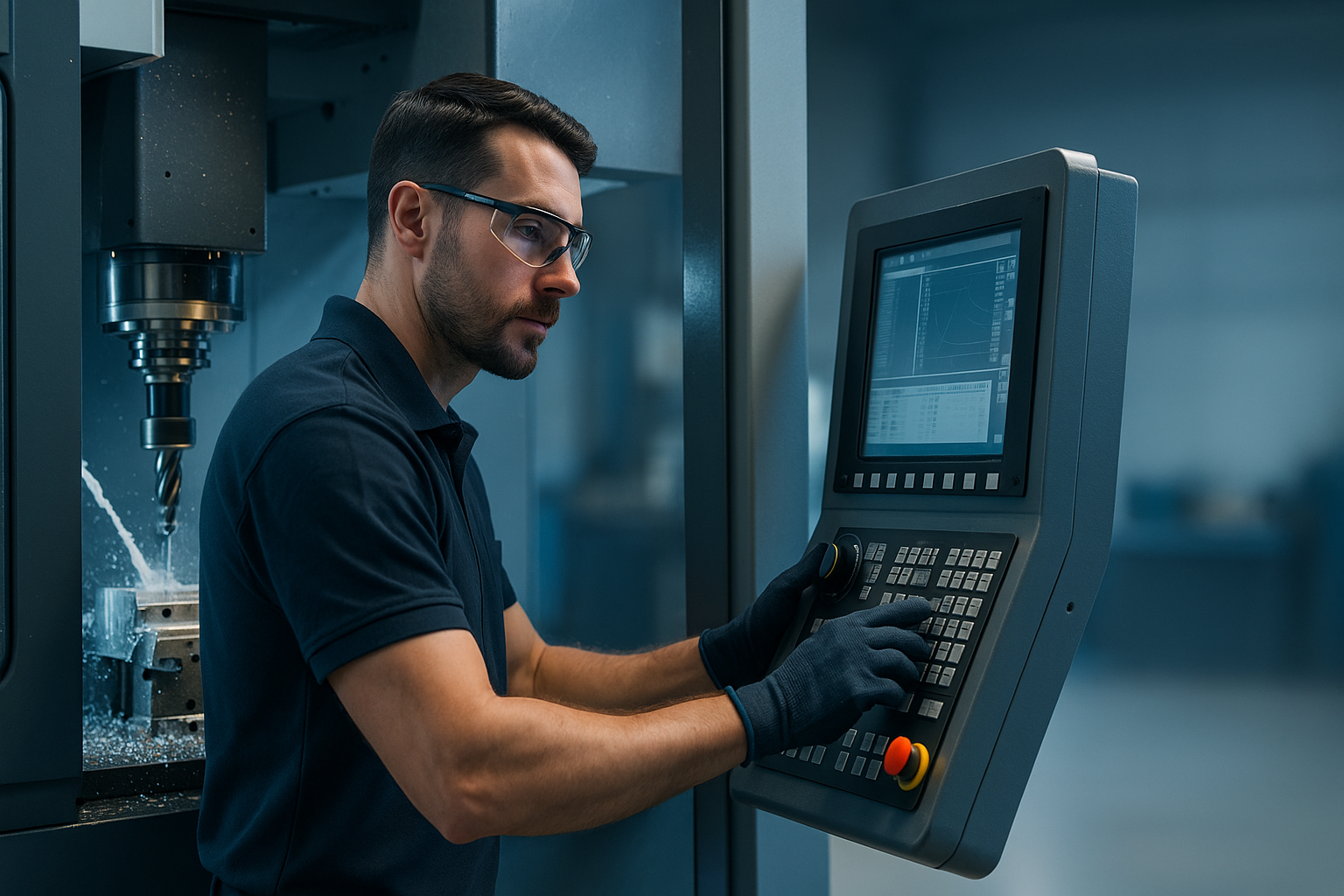CNC Machining Career Opportunities: What to Expect in 2025 and Beyond
CNC (Computer Numerical Control) machining represents the cutting edge of precision manufacturing, combining traditional machining skills with advanced computer technology. From aerospace components to medical implants, CNC machinists create the precise parts that power modern industry. With manufacturing reshoring to the United States, advanced technology integration, and a critical shortage of skilled machinists, this field offers exceptional career prospects and competitive compensation.
Why CNC Machining is a High-Demand Career
Market Drivers
Multiple powerful forces are creating demand for CNC machinists:
- Manufacturing reshoring bringing production back to America
- Aerospace industry growth requiring precision components
- Medical device manufacturing demanding tight tolerances
- Defense spending supporting domestic production
- Retiring workforce creating critical skills gap
- Advanced manufacturing requiring technical expertise
Career Advantages
CNC machining offers unique benefits:
- High-tech work environment (not traditional “dirty” manufacturing)
- Intellectual challenge combined with hands-on work
- Excellent income potential without college degree
- Strong job security in essential industry
- Climate-controlled work environments
- Advancement opportunities to programming and engineering
CNC Machining Career Paths
Entry-Level Positions
- CNC Machine Operator: $32,000-$45,000 annually
- Setup Operator: $38,000-$52,000 annually
- Quality Control Inspector: $35,000-$48,000 annually
Experienced Machinist Roles
- CNC Machinist: $45,000-$65,000 annually
- CNC Programmer: $50,000-$75,000 annually
- Tool and Die Maker: $50,000-$70,000 annually
Advanced and Specialized Positions
- CNC Programmer/Setup Specialist: $60,000-$90,000 annually
- Manufacturing Engineer: $65,000-$95,000 annually
- Production Supervisor: $60,000-$85,000 annually
- Master Machinist: $70,000-$100,000+ annually
- Shop Manager: $75,000-$120,000+ annually
Specialization Opportunities
By Machine Type
CNC Milling
- Vertical machining centers (VMC)
- Horizontal machining centers (HMC)
- 3-axis, 4-axis, and 5-axis machines
- Complex part geometries
- Most common specialization
- Wide industry application
CNC Turning (Lathe Work)
- CNC lathes and turning centers
- Swiss-style machines
- Live tooling capabilities
- Cylindrical part production
- High-volume production
- Medical component specialty
Multi-Axis and Advanced Machining
- 5-axis simultaneous machining
- Mill-turn centers
- Swiss-type automatic lathes
- Complex aerospace parts
- Premium skills, premium pay
- Cutting-edge technology
Specialty Processes
- EDM (Electrical Discharge Machining)
- Wire EDM
- Waterjet cutting
- Laser cutting and engraving
- Additive manufacturing integration
- Unique problem-solving opportunities
By Industry Sector
Aerospace Manufacturing
- Tight tolerance requirements (±0.0001”)
- Exotic materials (titanium, Inconel)
- Complex geometries
- Extensive documentation
- AS9100 quality standards
- Premium compensation
- Security clearances may be required
Medical Device Manufacturing
- FDA-regulated environment
- Biocompatible materials
- Microscopic tolerances
- Clean room manufacturing
- Implantable device components
- Excellent job stability
- Strong growth sector
Automotive and Transportation
- High-volume production
- Lean manufacturing principles
- Tooling and fixture work
- Prototype to production
- Electric vehicle components
- Industry transformation opportunities
Tool and Die Making
- Creating molds and dies
- Production tooling
- Maintenance and repair
- Precision grinding
- Problem-solving focus
- Highest skill level
- Premium wages
Job Shop and Prototype
- Variety of parts and materials
- Small to medium runs
- Quick turnaround demands
- Diverse skill development
- Problem-solving emphasis
- Never boring
Programming Specializations
Manual Programming
- G-code and M-code expertise
- Direct machine control
- Simple to moderate complexity
- Troubleshooting and optimization
- Foundation skill
CAM Programming (Computer-Aided Manufacturing)
- Mastercam, Fusion 360, SolidCAM
- Complex part programming
- Simulation and verification
- Toolpath optimization
- Industry standard approach
- Higher earning potential
Advanced Programming
- Multi-axis toolpath generation
- Macro programming
- Parametric programming
- Post-processor customization
- Automation integration
- Engineering collaboration
Education and Training Requirements
Training Pathways
- Trade school programs: 6 months to 2 years
- Community college programs: 2 years (AAS in Precision Machining)
- Apprenticeship programs: 4 years (8,000 hours)
- On-the-job training: Learning while working
- Military training: Navy, Air Force machining programs
Core Competencies
Successful machinists must master:
- Blueprint reading and GD&T (Geometric Dimensioning & Tolerancing)
- Precision measurement with micrometers, calipers, indicators
- Cutting tool selection and speeds/feeds
- Machine setup and work holding
- Quality control procedures
- Shop mathematics and trigonometry
- Material properties and characteristics
Important Certifications
NIMS Credentials (National Institute for Metalworking Skills)
- Level 1: CNC Milling and Turning fundamentals
- Level 2: Advanced programming and setup
- Master Level: Comprehensive expertise
- Industry-recognized standard
- Portable credentials
- Demonstrates competency
Manufacturer Certifications
- Haas, Mazak, DMG MORI machine training
- CAM software certifications (Mastercam, Fusion 360)
- Inspection equipment (CMM operation)
- Industry-specific quality standards
Quality and Safety
- ISO 9001 quality system awareness
- AS9100 aerospace quality (if applicable)
- OSHA 10-Hour general industry safety
- Forklift certification
What Makes a Successful CNC Machinist
Technical Knowledge
- Strong mathematical skills (algebra, trigonometry, geometry)
- Understanding of machining principles
- Material science fundamentals
- Cutting tool technology
- Computer and software proficiency
- Quality control methods
- Machine capabilities and limitations
Problem-Solving Abilities
- Troubleshooting machining issues
- Process optimization
- Fixture and work-holding design
- Tool selection and application
- Scrap reduction strategies
- Continuous improvement mindset
Attention to Detail
- Precision measurement skills
- Quality consciousness
- Following specifications exactly
- Documentation accuracy
- Setup verification
- First-piece inspection discipline
Mechanical Aptitude
- Understanding of how machines work
- Spatial reasoning abilities
- Mechanical troubleshooting
- Tool maintenance
- Machine calibration awareness
Professional Attributes
- Patience and persistence
- Safety consciousness
- Team collaboration
- Willingness to learn continuously
- Adaptability to new technology
- Pride in craftsmanship
Industry Outlook
Job Growth Projections
According to the Bureau of Labor Statistics:
- Machinist jobs expected to grow 4% through 2032
- Approximately 34,900 job openings annually
- Critical shortage of skilled machinists
- Particular demand for CNC programmers
- Advanced skills command premium wages
Manufacturing Renaissance
The industry is experiencing transformation:
- Reshoring initiatives bringing work back to U.S.
- Advanced manufacturing requiring higher skill levels
- Industry 4.0 integration (IoT, automation, data)
- Additive/subtractive hybrid manufacturing
- Sustainability focus in production
- Skilled trades gaining respect and recognition
High-Demand Employment Sectors
- Aerospace: Commercial and defense aircraft
- Medical devices: Implants and surgical instruments
- Oil and gas: Drilling and production equipment
- Automotive: Electric vehicle components, tooling
- Defense contractors: Military equipment and systems
- Job shops: Custom manufacturing and prototyping
- Tool and die shops: Production tooling
Geographic Opportunities
Major manufacturing regions:
- Michigan (automotive, aerospace)
- Ohio (manufacturing corridor)
- California (aerospace, medical devices)
- Texas (aerospace, energy, manufacturing)
- Connecticut (precision manufacturing)
- North Carolina (furniture, machinery)
- Wisconsin (machinery, equipment)
Tools and Equipment Investment
Essential Measuring Tools
Beginning machinists invest in:
- Precision measuring set (calipers, micrometers)
- Dial indicators and test indicators
- Height gauges
- Gage blocks and pins
- Thread gauges
- Edge finders and center finders
- Initial investment: $500-$2,000
Personal Hand Tools
- Hex keys (SAE and metric sets)
- Wrenches and specialty tools
- Deburring tools
- Files and scrapers
- Toolmaker’s clamps
- Additional investment: $300-$800
Advanced Measurement Equipment
Professional machinists may add:
- Digital readout (DRO) accessories
- Optical comparators (sometimes personal)
- Bore gauges and telescoping gauges
- Surface finish gauges
- Professional investment: $1,000-$5,000
Employer-Provided Equipment
Machine shops provide:
- CNC machines and controls
- CAM software and computers
- Cutting tools and holders
- CMM (Coordinate Measuring Machine)
- Quality lab equipment
- Material handling equipment
Safety Considerations
Primary Hazards
Machinists must be aware of:
- Rotating machinery (entanglement)
- Flying chips and particles
- Sharp cutting tools and edges
- Heavy material handling
- Coolant and cutting fluid exposure
- Noise from machinery
- Pinch points and crush hazards
Safety Protocols
Professional shops enforce:
- Machine guarding requirements
- Lockout/Tagout procedures
- Personal protective equipment use
- Chip control and housekeeping
- Proper lifting techniques
- Emergency stop procedures
- No loose clothing or jewelry
Personal Protective Equipment
Essential safety gear includes:
- Safety glasses (primary requirement, non-negotiable)
- Steel-toed safety shoes
- Hearing protection (in high-noise areas)
- Gloves (when handling materials, not during operation)
- Face shields (for certain operations)
- Shop coats or sleeves (no loose clothing)
Getting Started in CNC Machining
First Steps
- Research local training programs (technical colleges, community colleges)
- Visit machine shops to observe the work environment
- Take math courses if needed (algebra, trigonometry)
- Explore shop classes or maker spaces to gauge interest
- Consider entry-level positions (operator, quality inspector)
What to Look for in Training Programs
Quality machining programs offer:
- Modern CNC equipment (not just manual machines)
- Multiple machine brands and control types
- CAM software training (Mastercam, Fusion 360)
- Blueprint reading and GD&T curriculum
- Hands-on practice time (not just theory)
- NIMS certification preparation
- Industry-experienced instructors
- Job placement assistance
Entry Strategies
Operator to Machinist Path
- Start as CNC operator
- Learn machine operation
- Advance to setup and programming
- Employer may support additional training
- Earn while learning
- Proven path for many successful machinists
Training First Approach
- Complete technical school program
- Enter with foundational knowledge
- Start at higher level (setup operator)
- Quicker path to programming
- Investment in tuition
- May include internship opportunities
Apprenticeship Route
- Structured learning program
- Combination of classroom and OJT
- Journeyman certification upon completion
- Earn while learning
- Comprehensive skill development
- Union or non-union options
Career Advancement Opportunities
Progression Paths
CNC machinists advance by:
- Moving from operator to programmer
- Specializing in complex multi-axis work
- Becoming setup specialists
- Transitioning to quality engineering
- Moving into production supervision
- Advancing to manufacturing engineering
- Teaching at technical colleges
- Starting precision machining businesses
Programming and Engineering
Natural progressions include:
- CAM programmer (full-time programming)
- Process engineer (manufacturing methods)
- Manufacturing engineer (with additional education)
- Quality engineer (with metrology expertise)
- Applications engineer (machine tool companies)
Business Ownership
Starting a machine shop requires:
- Extensive technical expertise
- Business management skills
- Significant capital investment ($100,000-$1,000,000+)
- Customer acquisition
- Quality management systems
- Liability insurance and bonding
Alternative Career Paths
Machining skills transfer to:
- Quality control and inspection
- Manufacturing sales (technical knowledge valued)
- Field service engineering (machine tools)
- Technical training and instruction
- CNC software support and applications
- Manufacturing consulting
Income and Compensation
Factors Affecting Earnings
- Skill level and certifications
- Programming abilities
- Geographic location
- Industry sector (aerospace pays premium)
- Shift work (second and third shift premiums)
- Overtime availability
- Company size and type
Pay Structures
Machinists are typically paid:
- Hourly wage: Most common
- Salary: For programmers and supervisors
- Piece rate: Some high-volume production
- Skill-based pay: Increases with certifications
Additional Compensation
Many machining positions offer:
- Overtime pay (often abundant)
- Shift differentials (+10-15% for off-shifts)
- Health insurance and benefits
- Retirement plans (401k, pension)
- Tuition reimbursement
- Tool allowances
- Performance bonuses
- Profit sharing (some companies)
Overtime Opportunities
Manufacturing often includes:
- Regular overtime availability
- Time-and-a-half premium pay
- Can add $10,000-$25,000+ to base salary
- Some sectors work extensive overtime during busy periods
Technology and Future Trends
Industry 4.0 Integration
Modern machine shops incorporate:
- IoT-connected machines
- Real-time production monitoring
- Predictive maintenance systems
- Digital work instructions
- Automated inspection
- Data-driven optimization
Advanced Manufacturing Technologies
Emerging technologies include:
- Hybrid additive/subtractive machining
- Lights-out manufacturing (unmanned production)
- Robotic machine tending
- In-process inspection and verification
- Artificial intelligence for process optimization
- Digital twin simulation
Skills for the Future
Tomorrow’s machinists will need:
- Software proficiency beyond CAM
- Data analysis abilities
- Automation system understanding
- Network and connectivity knowledge
- Continuous learning mindset
- Adaptability to new technologies
Job Security Outlook
Despite automation concerns:
- Complex parts still require skilled setup
- Programming remains human-intensive
- Problem-solving cannot be automated
- Small to medium runs need flexibility
- High-mix, low-volume work growing
- Advanced skills in high demand
Work Environment and Lifestyle
Positive Aspects
- Climate-controlled facilities (typically)
- Intellectual challenge and problem-solving
- Tangible results of your work
- Respect from engineering teams
- Competitive wages without college debt
- Advancement opportunities
- Variety in daily work
- Pride in precision craftsmanship
Considerations
Be prepared for:
- Standing for extended periods
- Shift work in some facilities (24/7 operations)
- Repetitive tasks in high-volume production
- Noise in the work environment
- Coolant and oil exposure
- Continuous learning requirement
- Precision and accuracy pressure
Conclusion
CNC machining offers an outstanding career path for those seeking a high-tech, intellectually challenging skilled trade with excellent earning potential. The combination of hands-on work, computer technology, precision craftsmanship, and problem-solving makes it ideal for individuals who enjoy both technical work and continuous learning.
With American manufacturing experiencing a renaissance, the demand for skilled CNC machinists has never been stronger. Companies across industries—from aerospace to medical devices to automotive—are actively seeking qualified professionals and offering competitive compensation packages, benefits, and advancement opportunities.
The path to becoming a skilled CNC machinist requires dedication, mathematical aptitude, attention to detail, and commitment to continuous improvement. However, the rewards—both financial and professional—make it a worthwhile investment. Unlike many careers requiring four-year degrees and substantial student debt, CNC machining offers a faster path to good income, job security, and career satisfaction.
Whether you envision yourself programming complex multi-axis machines, creating precision aerospace components, or eventually managing a production department, CNC machining provides the foundation for a rewarding and stable career. If you enjoy working with technology, appreciate precision and accuracy, and want to be part of making tangible products, CNC machining deserves serious consideration.
Ready to machine your future? Research precision machining programs at local technical colleges, visit manufacturing facilities to see the work firsthand, and take the first step toward joining this essential and respected profession.



